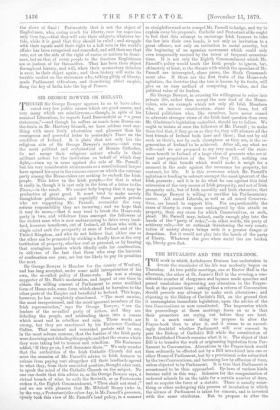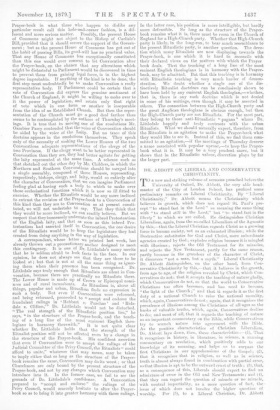THE RITUALISTS AND THE PRAYER-BOOK.
THE work to which Archdeacon Denison has undertaken to devote the remainder of his life was modestly begun on Thursday. At two public meetings, one at Exeter Hall in the afternoon, the other at St. James's Hall in the evening, a con- siderable number of clergymen and laymen made speeches and passed resolutions deprecating any alteration in the Prayer-, book at the present time ; asking that a reform of Convocation should precede any attempt to make such alterations; and objecting to the Bishop of Carlisle's Bill, on the ground that it contemplates immediate legislation, upon the advice of the two Convocations as now constituted. The impression which the proceedings at these meetings leave on us is that their promoters are crying out before they are hurt. It is a much easier thing to propose to alter the Prayer-book than to alter it, and it seems to us exceed- ingly doubtful whether Parliament will ever consent to pass the Bishop of Carlisle's Bill while the constitution of the Established Church remains what it is. The object of that Bill is to transfer the work of originating legislation from Par- liament to Convocation. Alterations in the Prayer-book would then ordinarily be effected not by a Bill introduced into one or other House of Parliament, but by a provisional order submitted by the two Convocations, and becoming law by efiluxion of time, unless objected to by Parliament. It is true that Parliament is accustomed to be thus approached. By-laws of various kinds become valid in this way. Schemes for the reorganisation of endowed schools lie on the table for a certain number of days, and so acquire the force of a statute. There is usually some- thing or other undergoing this process of incubation in which the silence of Parliament is taken for consent, and is invested with the same attributes. But to propose to alter the Prayer-book in what those who happen to dislike any particular result call this hole-and-corner fashion, is a dif- ferent and more serious matter. Possibly, the present House of Commons might not object to the Bishop of Carlisle's Bill, provided that it should secure the support of the Govern- ment; but as the present House of Commons has got out of the habit of passing Bills, its good-will has no practical value. That any House of Commons less exceptionally constituted than this one would ever consent to let Convocation alter the Prayer-book, on the chance that any alterations which might be distasteful to Parliament would be discovered in time to prevent them from gaining legal force, is in the highest degree improbable. If anything of the kind is to be done, the first step must undoubtedly be to make Convocation a really representative body. If Parliament could be certain that a vote of Convocation did express the genuine sentiment of the Church of England, it might be willing to make over to it the power of legislation, and retain only that right of veto which in one form or another is inseparable from the idea of an Established Church. But then the repre- sentation of the Church must go a good deal farther than seems to be contemplated by the authors of Thursday's meet- ings. It is true that in moving one of the resolutions Mr. Gambier Parry contended that the voice of Convocation should be aided by the voice of the Laity. But no trace of this doctrine appears in the resolutions themselves. They speak only of the necessity of making the Lower Houses of the two Convocations adequate representations of the clergy of the two Provinces, If the clergy want to be better represented in Convocation than they are, they had better agitate for getting the laity represented at the same time. A scheme such as that sketched out the other day by Mr. Childers, in which the Northern and Southern Convocations should be merged into a single assembly, composed of three Houses, representing, respectively, bishops, clergy, and laity, would BO entirely alter the character of Convocation, that we can imagine Parliament feeling glad at having such a body to which to make over those ecclesiastical functions which it is now so ill fitted to exercise. Whether the Ritualists would be any more inclined to entrust the revision of the Prayer-book to a Convocation of this kind than they are to Convocation as at present consti- tuted, we will not undertake to say. That they think that they would be more inclined, we can readily believe. But we suspect that they immensely underrate the inbred Protestantism of the English laity, and that i as soon as this inbred Pro- testantism had asserted itself n Convocation, the one'desire
of the Ritualists would i be to keep the legislature they had created from doing anything n the Way of legislation. A correspondent, whose letter we printed last week, has already thrown out a precautionary anchor designed to meet this contingency. It is one of Dr. Littledale's many merits that he is seldom afraid to look facts in the face. In our opinion, he does not always see that they are there to be looked at ; but that is not at all the same thing as ignor- ing them when their presence has been recognised. Dr. Littledale says truly enough that Ritualists are silent in Con- vocation, because there are practically no Ritualists there. The Lower House is made up of Crown or Episcopal nomi- nees and of rural incumbents. As Ritualism is, above all things, popular and urban, Ritualism finds no expression in
such a body. But even if Convocation were reformed, and being reformed, proceeded to " accept and endorse the fraudulent rulings in Hebbert v. Purehas ' and 'Rids- dale v. Clifton,'" Dr. Littledale would not be disturbed. "The real strength of the Ritualistic position lies," he says, "in the structure of the Prayer-book, and the teach- ing of a long line of the most eminent English theo-
logians in harmony therewith." It is not quite clear whether Dr. Littledale holds that the strength of the Ritualist position will not be affected even by a change in the structure of the Prayer-book. His confident assertion that even if Convocation were to accept the rulings of the Judicial Committee of the Privy Council, the Ritualists" could afford to unite," whatever that may mean, may be taken to imply either that so long as the structure of the Prayer- book remains the same, Convocation may do its worst ; or that Churchmen are only bound by the present structure of the Prayer-book, and not by any changes which Convocation may introduce into it. In the former case, we fail to see the
grounds of Dr. Littledale's confidence. A Convocation prepared to "accept and endorse" the rulings of the Privy Council, would scarcely hesitate to alter the Prayer- book so as to bring it into greater harmony with those rulings.
In the latter case, his position is more intelligible, but hardly
more defensible. So long as the structure of the Prayer- book remains what it is, there must be room in the Church of England for a High-Church party. Whether that High-Church party is likely, in the long-run, to bear much resemblance to the present Ritualistic party, is another question. The devo- tion which many Ritualists are now displaying towards the Prayer-book, is one which it is hard to reconcile with their declared views on the matters with which the Prayer book deals. That the teaching of a long line of the most eminent English theologians is in harmony with the Prayer* book, may be admitted. But that this teaching is in harmony with Ritualistic teaching is very much harder of demon- stration. We doubt whether a single one of the dis- tinctively Ritualist doctrines can be conclusively shown to have been held by any eminent English theologian,—whether, that is, there is any such doctrine which is not denied in some of his writings, even though it may be asserted in others. The connection between the High-Church party and the great Anglican theologians is obvious enough, but then the High-Church party are not Ritualists. For the most part, they belong to those anti-Ritualistic " pagans " whom Dr. Littledale happily and truly contrasts with the urban Ritualists. What we should naturally expect, therefore, from the Ritualists is an agitation to make the Prayer-book what they would like to see it. Instead of this, we find them com- mitted to an agitation,—if the meetings of Thursday deserve a name associated with popular uproar,—to keep the Prayer- book what it is. It may be a very prudent move, but it shows that in the Ritualistic valour, discretion plays by far the larger part.



































 Previous page
Previous page